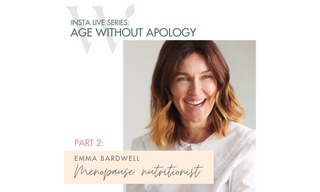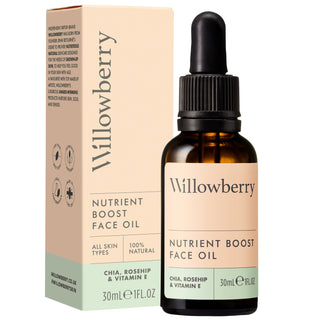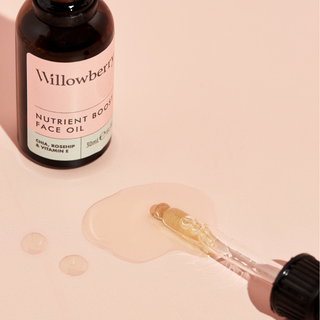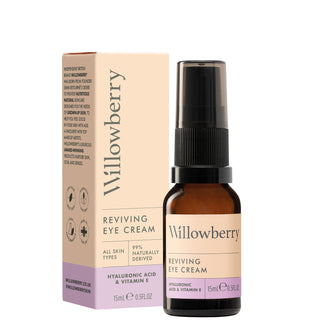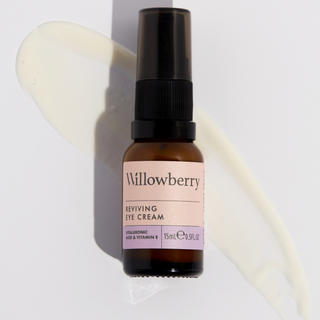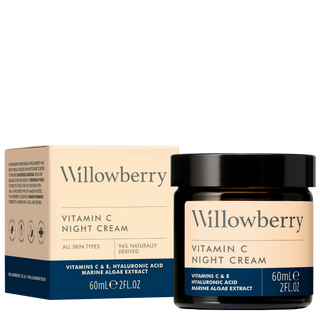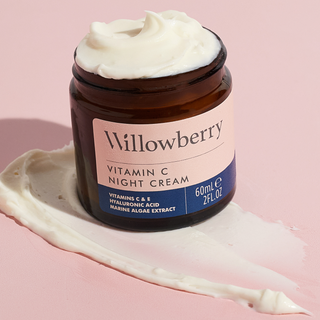Our Willowberry Age Without Apology Insta Live Series is held over on our Instagram page. These live chats with expert guests are designed to help you navigate age with confidence and style. Here are the highlights of our recent chat with menopause nutritionist Emma Bardwell - you can watch our chat in full here.
Back by popular demand, Emma Bardwell is a nutritionist specialising in women’s health. Following her illuminating first appearance on our Willowberry Age Without Apology Insta Live (watch that chat in full here), many of you asked for a Part 2 as there was still so much to cover! We invited Emma back as she celebrates the publication of her new book ‘The Perimenopause Solution’ (Vermilion). Written together with Dr Shahzadi Harper, it was described by Willowberry founder Jenni as like “your best mate telling you about perimenopause over a glass of wine”.
The idea behind your book ‘The Perimenopause Solution’
We wanted it to talk to all women, all backgrounds, all ethnicities. It’s a confusing time, perimenopause, lots of women are very tired, fatigued, they’ve got brain fog, they don’t want to be trawling through reams and reams of dense copy. We wanted it to be accessible. That’s why at the end of each chapter we do this ‘bottom line’ where we give bullet points to summarise.
The difference between perimenopause and menopause
Menopause is literally the day of your final period. It’s a retrospective diagnosis so when you haven’t had a period for 12 months you look back and say that was my menopause.
Peri means ‘around the time of’ so perimenopause is the lead up which is the most important time, because that’s the time that really throws women and can cause lots of symptoms.
We’re more likely to recognize the word ‘menopause’ than ‘perimenopause’ yet perimenopause is the main part of the process that we experience
Probably because women’s health isn’t talked about enough, so we don’t go into enough detail, or we haven’t traditionally. I think it’s important to get that terminology right so that when you are talking to your GP or healthcare professional you are talking about the same thing. It’s important to differentiate and talk about perimenopause because it can be something that really affects younger women. Perimenopause can start affecting women as early as their late 30s, early 40s.
Not all perimenopause experiences are created equal
We have different backgrounds; different genetics; different medical histories; we come from different ethnicities; socio-economic groups; we experience different stress levels - and stress plays a massive role in how a woman experiences this journey. Even something which we might have thought was unrelated, like your microbiome, can affect how you experience your perimenopause symptoms.
It’s not a linear journey
Lots of women feel very out of control because it is very hard to control your hormones at this time. Your experience might be quite effortless and then it gets hard and then it kind of evens out and then again you start to struggle. It isn’t linear, it’s going to be quite up and down, and it can be affected by factors that are going on like your relationship; how much sleep you’ve had; whether you’re looking after yourself; whether you’re turning to booze as a kind of crutch. There’s a lot at play.
How to know whether it’s perimenopause you’re experiencing
First of all, I tell my clients there is quite a big crossover between certain conditions that can rear up around this time. Hyperthyroidism and hypothyroidism (particularly hypo) have very similar symptoms to perimenopause: fatigue; changes in hair; changes in skin; weight gain; things like that. Low iron can also be common in women around this age. B12 deficiency mimics brain fog and mood changes, vitamin D deficiency also. So, I think the first thing to do is get those things checked-up and ruled out.
… know your cycle
It’s important to track your periods. Usually, erratic periods are one of the first signs that something is happening so use an app like Clue to make sure you’ve got a record of what is happening each month. If you’re under 45 you can ask to get your FSH (follicle stimulating hormone) levels checked by your GP. If you’re over 45 and you’re experiencing symptoms, I would take it for granted that it’s perimenopause: it’s happening, things are shifting.
Knowledge is power
If you’re a younger woman, pre-empt perimenopause. Don’t wait for these things to start happening to you before you start looking into how to deal with it. Knowledge is power so we need to be forearmed. Doing a bit of a life audit around this time is important. Get your vitamin levels checked: things like B12; folate; iron; vitamin D; get your cholesterol levels checked. Take control of your hormones before they take control of you. Essentially, make sure that you’re aware of what’s happening and that you are able to talk to people. There are lots of forums, books, podcasts, websites: there’s a ton of information out there.
How to talk to your GP
Talk to your GP the minute you start to think things might be shifting. Most surgeries will have a specialist in women’s health and if not, you can ask to be referred to a menopause clinic. There are also private options if you can afford it. Be aware of what your symptoms are, so when you go to your GP you can make the most of those 6 or 7 minutes that you get. Ask for a double appointment if you can. Have an idea of what you want from your GP.
A problem shared
Find your tribe, find your perimenopause posse so that you don’t feel so alone, and you can bounce ideas around. Some women don’t want to admit to going through perimenopause, they don’t want to talk about it but for lots of women, the minute you bring up the subject it’s like … whoosh!
When will perimenopause end?
For the majority of women, once they have entered into menopause their symptoms mostly die down, but I’ve got clients who are in their 60s, 70s and they are still having hot flushes, so it’s not guaranteed. We often talk about coming out of menopause, but you don’t really come out of it, you learn to live with it. It’s a new chapter, it’s a shift. Things won’t be the same again, but it doesn’t mean that it’s necessarily a bad thing.
Losing your old self
I don’t know about you, but I don’t really want to go back. There are certain things: I’d love my boobs back, I’d love my skin not to be so saggy, I’d love not to be so creaky in the mornings but for all those things, I’m a lot happier in my own skin, I know myself a bit more, I’m more intuitive, I take less bullshit from people. It’s lovely, it’s liberating, it really is.
Magnificent Midlife
There is something quite magnificent about midlife, there’s a real strength, and a force and a real energy: we have to harness this power going forwards.
Willowberry is nutritious natural skincare for grown-ups, for your best skin.
A favourite with top make-up artists, Willowberry's luxurious award-winning products protect skin’s natural barrier function, to nourish and revive grown-up skin without telling women to be 'anti-ageing'.
As seen in Vogue, Independent, The Telegraph, This Morning and more.

